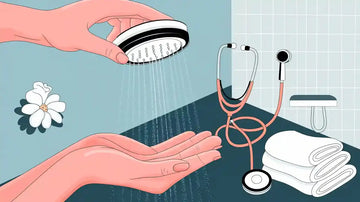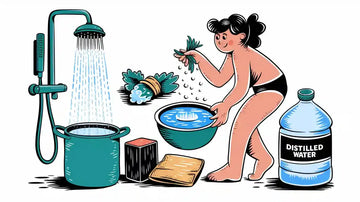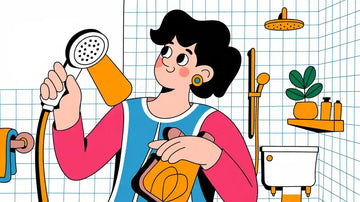Imagine you take a shower after a long day. Your skin feels tight, and your hair looks flat and dull—common issues for those dealing with hard water. You might notice limescale buildup on your shower head, especially if you don’t have a shower head for hard water. You may also feel a sticky layer on your skin. Some typical problems include:
Minerals in hard shower water clog pores, causing dry and itchy skin.
Soap scum accumulates, making hair look dull and skin feel irritated.
Calcium deposits stick to hair roots, leading to an itchy scalp.
Study Description |
Participants |
Duration |
Key Findings |
|---|---|---|---|
15 females |
30 days |
Hair became thinner and looked rough after exposure to hard water. |
|
Hair Strength Study |
70 males |
N/A |
Hair lost strength and broke more easily when washed with hard shower water. |
You might wonder if a shower filter or a specialized shower head for hard water can solve these problems. This article explains what a shower filter can and cannot do to improve your experience with hard water.
Key Takeaways
Hard water has minerals like calcium and magnesium. These minerals can make your skin dry. They can also make your hair look dull. Hard water can cause limescale on shower heads.
Shower filters take out chlorine and some chemicals. This can make your skin feel softer. It can also make your hair look shinier. But shower filters cannot remove hard water minerals.
Water softeners take out hard minerals from water. They stop limescale from building up. They help protect pipes and appliances. But water softeners do not remove chlorine.
Using both a shower filter and a water softener works best. This helps your skin, hair, and home stay protected.
Test your water to see if it is hard. Then pick a shower filter or water softener. Choose what fits your needs, budget, and how much work you want to do.
Hard Water Basics
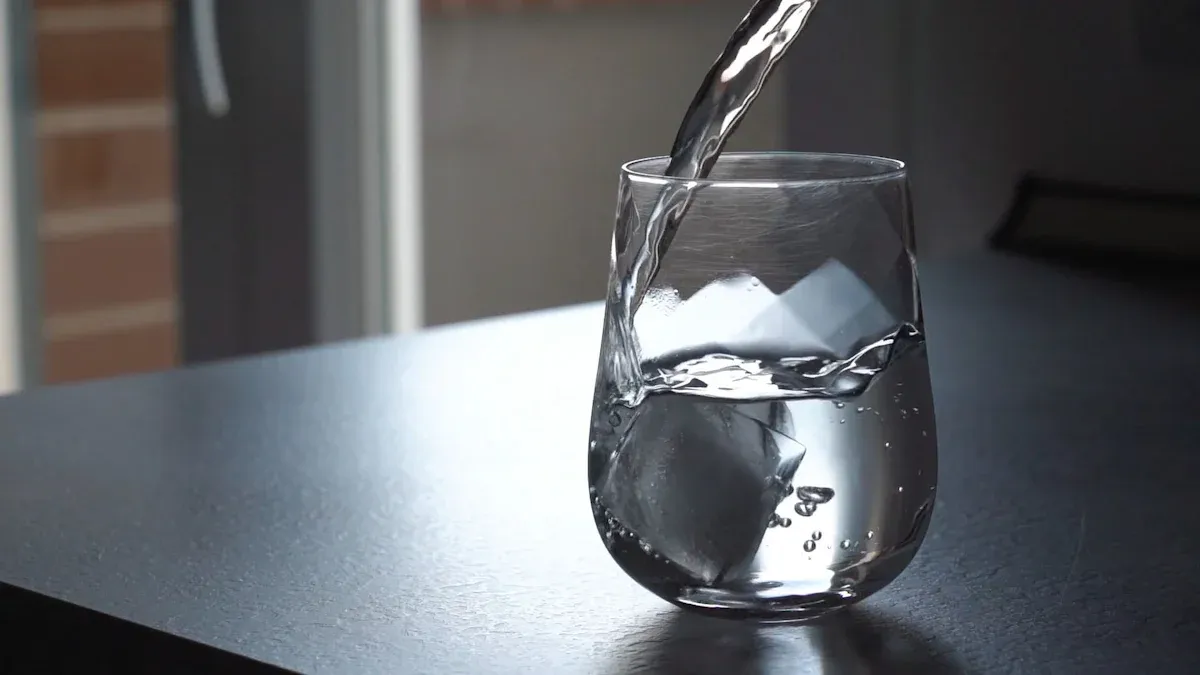
What Is Hard Water
You may hear the term "hard water" and wonder what it means. Hard water contains high levels of minerals, mainly calcium and magnesium. These minerals come from rocks like limestone and dolomite as water moves through the ground. When you use water with a lot of these minerals, it is called hard. The main difference between hard and soft water is the amount of these minerals. Soft water has very few minerals.
Scientists measure water hardness by looking at the amount of calcium and magnesium in the water. Water quality experts use units like milligrams per liter (mg/L) or grains per gallon (gpg) to show how hard your water is. Hardness can be temporary or permanent. Temporary hardness comes from minerals that can be removed by boiling. Permanent hardness stays even after boiling.
Hard water also contains other minerals like iron, zinc, and manganese, but calcium and magnesium are the most important. These minerals can help your body in small amounts, but too much can cause problems in your home and on your skin.
Tip: If you want to know your water quality, you can use test strips or ask a professional to test your water.
Signs You Have Hard Water
You can spot signs of hard water in your home. Here are some common clues:
White spots or chalky residue on faucets and shower doors
Soap that does not lather well and leaves scum on your skin or bathtub
Dry, itchy skin and dull hair after showering
Reduced water flow from your shower head for hard water due to mineral buildup
Clothes that feel stiff after washing
Description |
|
|---|---|
Below 1.0 |
Soft |
1.0 to 3.5 |
Slightly Hard |
3.5 to 7.5 |
Moderately Hard |
7.5 to 10.5 |
Hard |
Above 10.5 |
Very Hard |
If your water quality test shows a high number in these ranges, you have hard water. Hard water can lower water quality and cause problems like scale buildup in pipes and appliances. Over time, this can lead to costly repairs.
Shower Filter Function
What a Shower Filter Removes
A shower filter helps make your shower water better. It takes out things you do not want in your water. When you put in a filter, it can get rid of skin-damaging chlorine, some heavy metals, and organic chemicals. Many filters use special stuff like KDF, activated carbon, or Vitamin C. These things work together to make your shower water nicer and safer.
KDF uses a reaction to change skin-damaging chlorine into safe chloride ions. This helps keep your skin and hair from getting irritated. Vitamin C filters also get rid of chlorine and chloramines. These are often found in city water. Some filters use carbon blocks to catch bad smells and organic stuff. Others have ceramic balls or tourmaline to help with pH and make the water look clearer.
Note: Most shower filters use more than one kind of media. This helps them remove more impurities and lower bacteria. You get cleaner and fresher water this way.
Some filters have certifications from groups like NSF or WQA. These show the filter can take out at least half of the chlorine at normal shower speeds. Some filters also trap lead, mercury, and even bacteria. This makes your shower water much safer. Multi-stage filters use many types of media. They can remove more bad stuff than single-stage filters.
Here is a table that shows what a shower filter can take out:
Contaminant |
Health Risks |
How the Filter Works |
|---|---|---|
Skin-damaging chlorine |
Dry scalp, brittle hair, skin irritation |
KDF, Vitamin C, Carbon Block |
Lead |
Affects brain and nerves |
KDF traps lead inside the filter |
Mercury |
Damages brain and kidneys |
KDF removes mercury by chemical reaction |
Bacteria, Fungi |
Can cause infections |
KDF controls bacteria growth |
Organic Chemicals |
May cause odor or irritation |
Carbon block absorbs chemicals |
Many people say their skin feels less dry after using a shower filter. Their hair looks shinier too. You might see less soap scum in your tub. The water may not smell as bad. Some filters even help stop hair from falling out by taking out harsh chemicals.
What a Shower Filter Can’t Remove
A shower filter makes your water cleaner, but it cannot fix every problem. The most important thing is that it does not soften hard water. It cannot take out calcium and magnesium. These minerals make water hard. They cause scale on your shower and make your hair feel rough. Even the best multi-stage filters cannot take out these minerals. The filter media is not made for that job.
Alert: If you want to make your water soft and stop scale, you need a water softener for your whole house. Only ion-exchange systems can take out calcium and magnesium.
Shower filters also cannot remove all chemicals and heavy metals. The filter is small, so it cannot take out a lot of lead or arsenic if there is too much. Some filters say they remove bacteria, but they may not work well if the water is very dirty or if you forget to change the filter.
Here are some things a shower filter cannot do:
Soften hard water or take out calcium and magnesium
Remove all heavy metals if there is a lot
Get rid of all bacteria in very dirty water
Take out dissolved minerals that make limescale
If you live where the water is very hard, you might still see white spots or scale on your shower head. This can happen even if you use a filter. The filter will help with skin-damaging chlorine and some other things. But it cannot stop all the problems from hard water. For the best results, you may need both a shower filter and a water filtration system for your whole house.
Shower Head for Hard Water Solutions
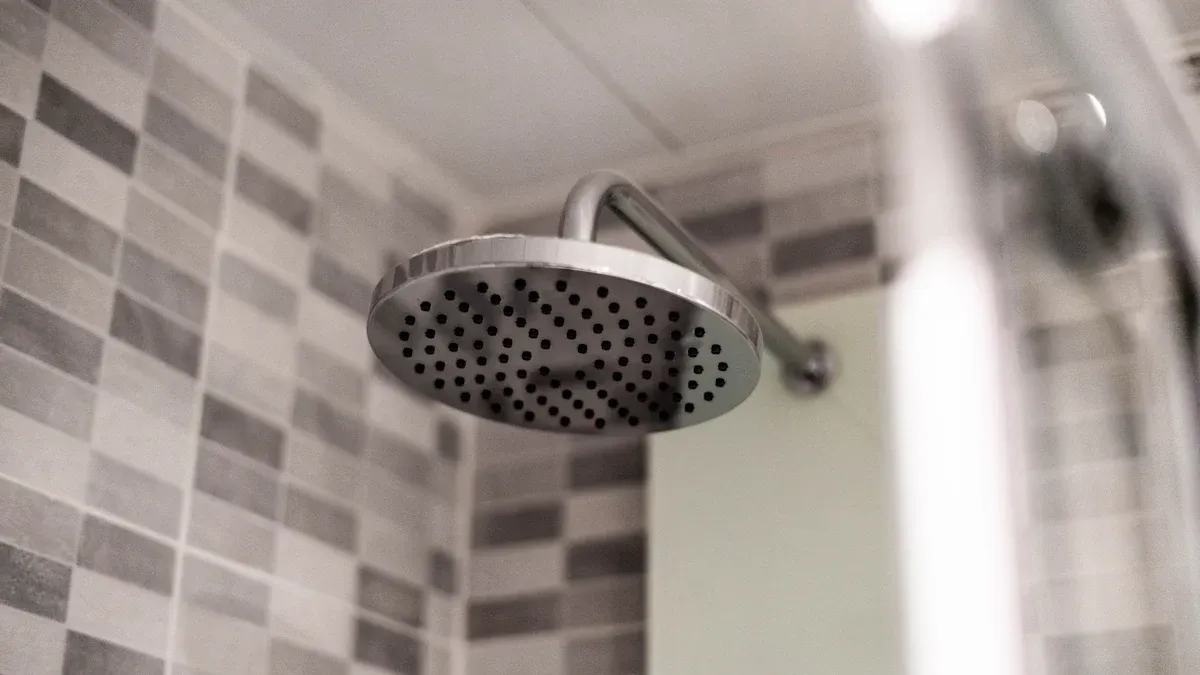
Shower Filter vs. Water Softener
If you want a shower head for hard water, you have two main choices. You can use a shower filter or a water softener. Each one helps in a different way.
A shower filter goes on your shower head for hard water. It takes out chlorine, some heavy metals, and other things. Your skin may feel less dry. Your hair might look better after using a filter. Filters use carbon block, KDF, or calcium sulphite. These help remove chlorine and make water better at the shower. But a shower filter does not take out the minerals that make water hard. Calcium and magnesium stay in the water. You will still see limescale and white spots on your shower head for hard water if you only use a filter.
A water softener works in another way. It treats all the water in your house, not just the shower. Water softeners use ion exchange to take out calcium and magnesium. This stops scale from building up in pipes and appliances. You may notice softer skin, shinier hair, and less soap scum. Water softeners do not take out chlorine or other chemicals. But they fix the main problem of hard water minerals.
Note: Some shower filter brands say they soften water. But tests show they do not lower the minerals that make water hard. Only a water softener can do this.
Here is a table to show the differences:
Feature |
Shower Filter |
Water Softener |
|---|---|---|
Removes chlorine |
Yes |
No |
Removes calcium/magnesium |
No |
Yes |
Improves skin and hair feel |
Yes (by removing chlorine) |
Yes (by softening water) |
Prevents limescale |
No |
Yes |
Treats whole house |
No (shower only) |
Yes |
Cost |
$700+ |
|
Maintenance |
Replace every 3–6 months |
Salt refills, regular checks |
You might want both a shower filter and a water softener for the best water. Shower filters are good for taking out chlorine and some metals. Water softeners are the only way to get rid of hard water minerals. Claims about multi-stage filters softening water are not true, according to lab tests.
🧪 Lab tests show: Shower filters can take out chlorine but do not lower the minerals that cause hard water. Only water softeners can do that.
Choosing the Right Option
You should pick the best choice for your water, money, and needs. Here are some steps to help you:
Test your water hardness. Use a home kit or ask a pro. You can also check your local water report.
Find your main problems. Do you see small stains or big scale in pipes?
Set your budget. Shower filters cost less but need new ones often. Water softeners cost more but help your whole house.
Think about maintenance. Shower filters are easy to change. Water softeners need salt and checks.
Think about the environment. Salt-free systems are better for nature. Salt-based softeners work best for very hard water.
Decide on DIY or pro help. Pro systems last longer and work better. DIY fixes may help for a short time.
Criteria |
Details & Considerations |
|---|---|
Test your water with grains per gallon or PPM. Use home kits or ask a pro. |
|
Household Water Challenges |
Look for small stains or big buildup in pipes. |
Budget Considerations |
Compare first costs and how much you spend later. |
Maintenance Preferences |
Pick low-maintenance or regular upkeep. |
Treatment Options |
Ion exchange, water softeners, reverse osmosis, salt-based or salt-free systems. |
Environmental Impact |
Salt-free systems are kinder to the planet. |
Professional vs DIY |
Pro treatments work better for a long time. |
Tailored Solutions |
Match your treatment to your water and home needs. |
If your problems are small, a shower filter can help your shower feel better. You may notice less chlorine smell and softer skin. If your water is very hard, you need a water softener to protect pipes and appliances. Sometimes, using both a shower filter and a water softener gives the best results.
Tip: Change your shower filter every 3 to 6 months or after 10,000 to 12,000 gallons of water. This keeps your water good and your shower head for hard water working well.
Benefits and Limitations
Skin and Hair Effects
When you use a shower filter, your skin and hair can change. Many people say their skin feels softer and less itchy after using one. The shower filter takes out chlorine and some metals. This helps keep your skin’s natural oils safe. Your skin may feel less dry, flaky, or irritated. If you have sensitive skin or eczema, you might have fewer flare-ups.
A shower filter also helps your hair. It removes chemicals that make hair look dull and feel weak. Your hair may look shinier and be easier to brush. The filter stops residue from building up on your scalp. This means less itchiness and fewer flakes. You may also see your shampoo makes more bubbles, so you use less.
Area |
Benefit of Shower Filter |
Limitation |
|---|---|---|
Skin |
Less dryness, fewer breakouts |
Does not remove all minerals |
Hair |
More shine, less breakage |
Some dullness may remain |
Scalp |
Less itchiness, fewer flakes |
Cannot fully prevent buildup |
🧴 Tip: For the best results, use a gentle cleanser. Rinse your hair well after every shower.
Fixture and Limescale Impact
A shower filter gives some help to your bathroom fixtures. It lowers the amount of chlorine and some metals. These can cause stains and rust. You may see fewer white spots on your shower head and glass doors. The filter can slow down soap scum and film on your tub and tiles.
But a shower filter cannot stop all limescale problems. Minerals like calcium and magnesium still get through. These minerals make hard, chalky limescale. Over time, limescale can clog your shower head and lower water flow. Cleaning can get harder. Your water heater or washing machine may not work as well because of scale.
Limescale forms when water dries and leaves minerals behind.
Appliances may break sooner and need more repairs.
If you want to fully protect your fixtures and appliances, you need a whole-house water softener. A shower filter helps with some problems, but it cannot remove the minerals that cause limescale.
You have learned that shower filters take out chlorine and some chemicals. This can help your skin and hair feel nicer. But shower filters do not get rid of the minerals that make water hard. Look at the table to see what each filter media does and does not do:
Filter Media |
Benefits |
Limitations |
|---|---|---|
Carbon Block |
Takes out chlorine, makes water smell better |
Does not take out minerals that make water hard |
KDF |
Lowers chlorine and some heavy metals |
Does not work well on hard water minerals |
Vitamin C |
Gets rid of chlorine |
Does not remove minerals or metals |
Use a shower filter if you want softer skin and less chemicals.
Pick a water softener if you want to stop limescale and keep pipes safe.
Many families spend more money on water softeners in places with very hard water.
Most people find that a shower filter is an easy way to make showers better. But if your water is very hard, a water softener works best.
FAQ
Do shower head filters remove all hard water minerals?
No, shower head filters do not remove calcium or magnesium. These minerals cause hard water. Only a water softener can take out these minerals and fully soften your water.
How often should you change a shower filter?
You should change your shower filter every 3 to 6 months. Some filters last for 10,000 to 12,000 gallons. Always check the manufacturer’s instructions for the best results.
Can a shower filter help with skin problems?
Yes, a shower filter can help reduce dryness and irritation. It removes chlorine and some chemicals. Your skin may feel softer and less itchy after using a filter.
Will a shower filter stop limescale on my shower head?
A shower filter cannot stop limescale. Hard water minerals still pass through the filter. You may still see white spots or buildup on your shower head.
Is it better to use both a shower filter and a water softener?
Yes, using both gives you the best results. The water softener removes hard minerals. The shower filter takes out chlorine and chemicals. Your skin, hair, and fixtures benefit from both.



